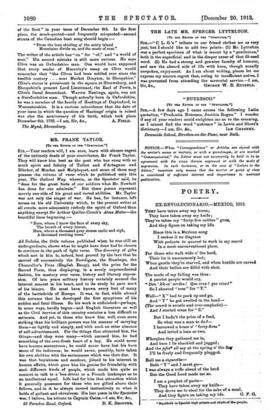MR. FRANK TAYLOR.
[To THE EDITOR OF THE " SPECTATOR:1 SIR,—Your readers will, I am sure, learn with sincere regret of the untimely death of your contributor, Mr Frank Taylor. They will know him best as the poet who has sung with so much spirit and felicity of Talbot and d'Artagnan and
Blucher, of Minden and tdalplaquet, and some of them may possess the volume of verse which he published only this year, The Gallant Way, wherein, as the Spectator said, he "does for the great feats of our soldiers what Mr. Newbolt has done for our admirals." But these poems represent merely one side of his great and varied abilities. Mr. Taylor was not only the singer of war. He has, for instance, left verses on his old University which, to the present writer at all events, more adequately embody the spirit of Oxford than anything except Sir Arthur Quiller-Couch's Alma Mater—the beautiful lines beginning :- "Here, where I know the face of every sky,
The breath of every breeze, Here, where a thousand grey stones smile and sigh, A thousand rustling trees."
Ad Sodales, the little volume published when he was still an undergraduate, shows what he might have done had he chosen to continue in the path of light verse. The diversity of gifts which met in him is, indeed, best proved by the fact that he carried off successively the Newdigate, the Stanhope, the Chancellor's Prize (English Essay), and the prize for the Sacred Poem, thus displaying, in a surely unprecedented fashion, his mastery over verse, history and literary expres- sion. Of late years military history certainly seemed the interest nearest to his heart, and to its study he gave most of his leisure. He must have known every foot of many of the battlefields of Europe. It was, in fact, while abroad this autumn that he developed the first symptoms of his sudden and fatal illness. So his work is unfinished—perhaps, in some ways, hardly begun—and English literature as well as the Civil Service of this couutry sustains a loss difficult to estimate. And yet, to those who knew him well, even more striking than his brilliant powers was his manner of carrying them—so lightly and simply, and with such an utter absence of self-advertisement. For the things that attracted him, the things—and they were many—which amused him, he had
something of the ever-fresh heart of a boy. He could never have become sententious ; he could never have lost his keen
sense of the ludicrous; he would never, possibly, have taken his own abilities with the seriousness which was their due. It was that boyishness and candour, joined to his interest in human affairs, which gave him his genius for friendship with such different kinds of people, which made him quite as content to talk to a 'bus-driver or a French innkeeper as to an intellectual equal. Life had for him that attraction which it generally possesses for those who are gifted above their fellows, and in it he always turned instinctively to what it holds of gallant and chivalrous. His last poem in the Spectator was, I believe, his tribute to Captain Oates.—I am, Sir, &c.,










































 Previous page
Previous page